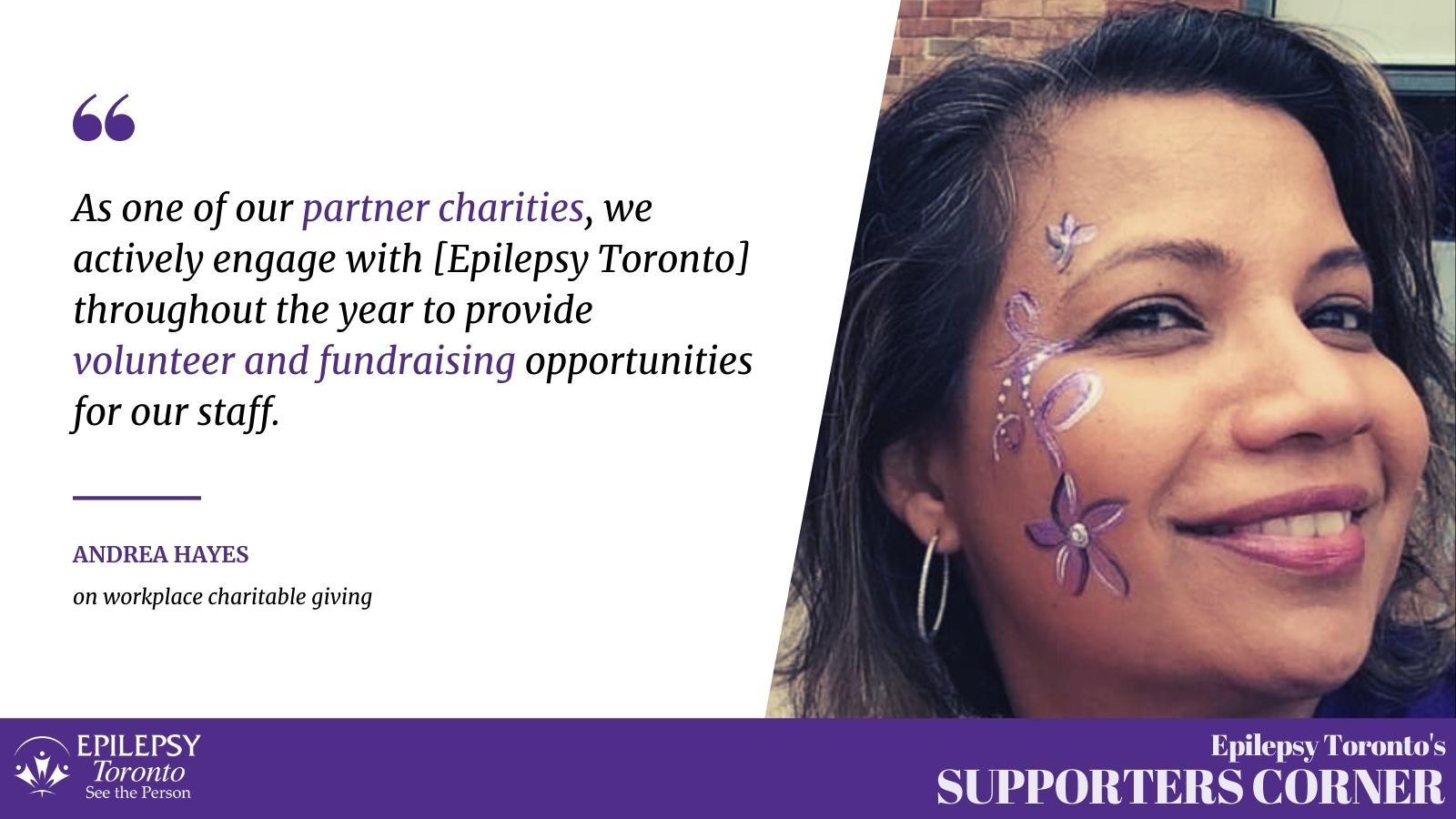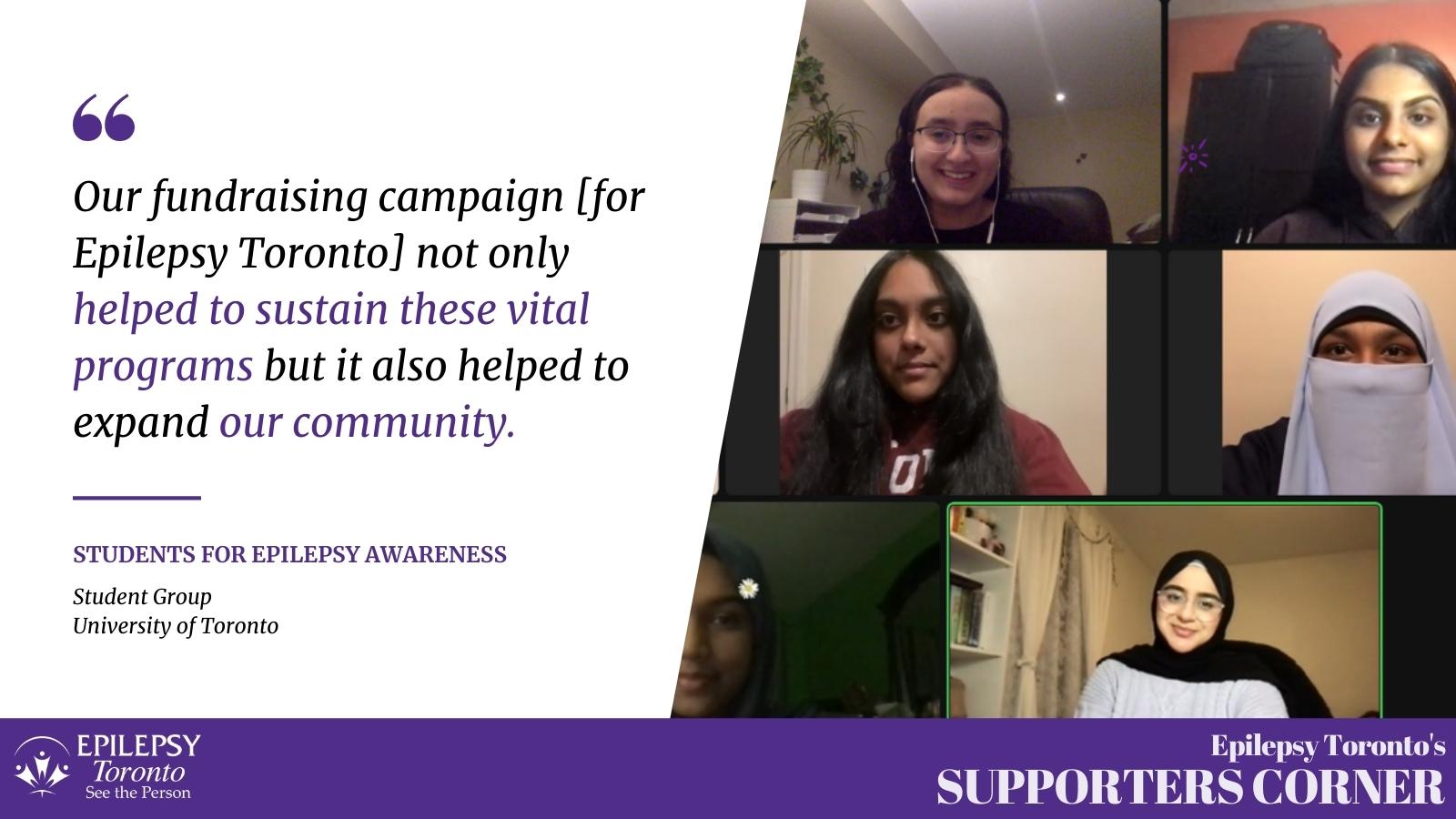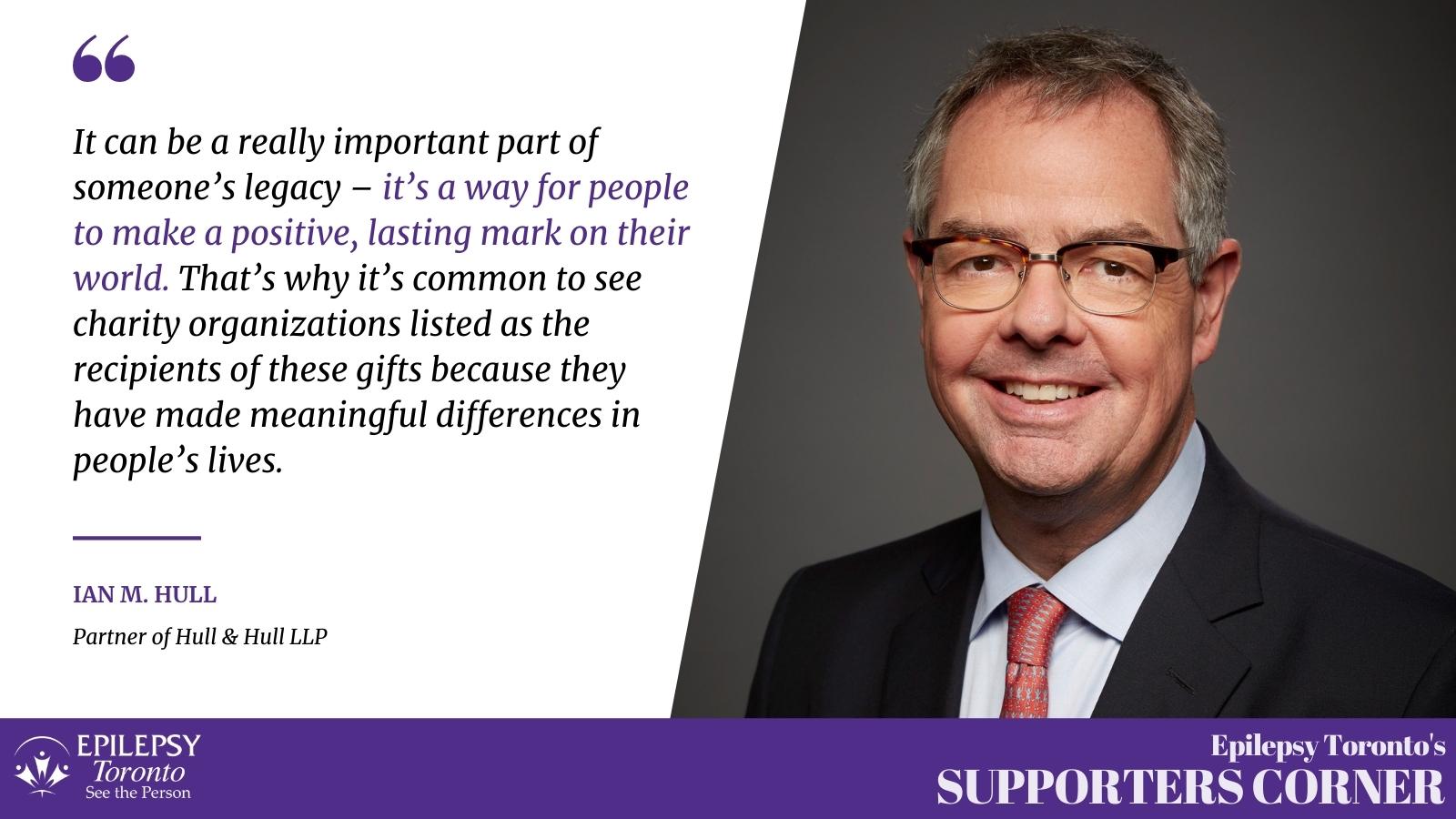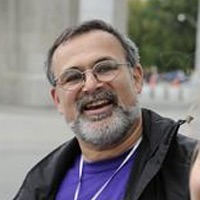Supporters Corner: Meet Real People Who Are Making a Difference
Welcome to Supporters Corner! We receive a lot of questions asking us how you can help support Epilepsy Toronto. Each edition of Supporters Corner will explore different and creative ways that you can help make a difference. Scroll down to learn more and meet some people who are helping make a difference.
If you have any questions about how you can support Epilepsy Toronto, please email us at [email protected].
Andrea Hayes: Workplace Charitable Giving

Q: Hello Andrea, thanks for talking to us about workplace charitable giving. How long have you been with Mackenzie Investments Charitable Foundation?
A: I have been part of the Foundation’s Employee Committee since 2015 and got the opportunity to join when one of my colleagues was leaving the company. I felt that I would be making a difference in the community in my own way by delegating time and effort for the benefit of others.
Q: What is the mission/mandate of the Mackenzie Investments charitable foundation?
A: The Mackenzie Investments Charitable Foundation is a non-profit organization that co-ordinates charitable giving and volunteerism at Mackenzie Investments. The Foundation supports charities across Canada, with a special focus on organizations that help women and children at risk.
Q: How does supporting Epilepsy Toronto fit into that mission?
A: Epilepsy Toronto’s Children and Youth Services Programming aligns with the Foundation’s mission to support charities with a special focus on children and youth with complex health issues.
Q: How does Mackenzie Investments support Epilepsy Toronto?
A: As one of our partner charities, we actively engage with them throughout the year to provide volunteer and fundraising opportunities for our staff. Mackenzie is invested in creating a better world. We believe in the power of investing responsibly, creating an inclusive culture, and giving back to our communities.
Q: What benefits you have seen from aligning with your charitable partners?
A: Coming together as a compassionate and caring community committed to support the causes that matter most to our employees, helping those in need by participating in volunteer events and fundraising activities, promoting wellbeing activities that are important for work-life balance that enhances our awareness.
Q: If someone was hoping to ask their own employer to support Epilepsy Toronto in a similar way, what do you think some of the best ways to start that conversation would be?
A: First, they can find out if their company supports charitable giving. If they don’t, maybe that’s a conversation that you can start at your workplace. If they already do support charitable giving, you can be an advocate by finding out ways that Epilepsy Toronto aligns with their company’s initiative and present Epilepsy Toronto as a potential partner. You can also invite Epilepsy Toronto to speak with your company, invite Epilepsy Toronto to apply for available funding from their company, and be an ambassador.
If you have any questions about how you can get involved in charitable workplace giving, feel free to contact us! You can email us at [email protected].
Students for Epilepsy Awareness: Third Party Fundraising

Q: Hello Students for Epilepsy Awareness (SEA)! Could you tell us about yourselves?
A: We’re a non-profit student group at the University of Toronto (UofT) dedicated to raising awareness about epilepsy and removing the stigma associated with it. We accomplish this by using social media to educate ourselves and the community about epilepsy and new epilepsy research. Our organization helps people with epilepsy and their families by generating funding for critical programs like Epilepsy Toronto, and volunteering at epilepsy awareness events.
Q: Could you talk a little bit more about who you are and your work at the UofT campus?
A: Our organization is composed of individuals who have epilepsy, those with family members who have epilepsy, and people who want to learn more about the condition and support others. One thing we all have in common is a desire to raise awareness and build a sense of community at UofT.
Although we are located on the Scarborough campus, we have members from all of the other campuses. We are striving to establish a foundation and platform for students with epilepsy to discuss their needs and the support they may require in order to make their post-secondary experience as comfortable as possible at the University of Toronto. We also intend to keep students connected to crucial resources, such as those provided by Epilepsy Toronto!
Q: You support Epilepsy Toronto through volunteering and your own fundraising events. Can you talk a little more about the fundraiser that you recently hosted?
A: Yes, of course! We recently organized a donation campaign where we used social media to raise funds for Epilepsy Toronto’s services. In just over a month, we were able to raise over $200 using Instagram, Facebook, and other social media channels. Our fundraising came to a close with a draw for a chance to win a fantastic gift. We’re hoping to raise much more money in the following months.
Q: You used the Canada Helps website to set up a fundraising page to host your campaign. How was that experience and how did your donors feel using the web page you made through Canada Helps?
A: We were able to create our contribution page in less than an hour using the Canada Helps website, including all of the required information, instructions, and links to both register for our draw and to donate. Our contributors were able to donate fast and easily, and they had no issues using our page!
Q: Did you have any questions or need any help setting up your page?
A: It was super easy to set up our page by ourselves but Epilepsy Toronto was always willing and ready to assist us when we had any questions. They provided ideas and recommendations on how to conduct a successful fundraiser, and responded to all of our other questions!
Q: What was the best part of doing this fundraiser and would you do something like this again?
A: The most rewarding aspect of running this fundraiser was witnessing the community’s incredible generosity in their donations and interacting with all of the new members who reached out to us after viewing the fundraiser. Our fundraising campaign not only helped to sustain these vital programs at Epilepsy Toronto, but it also helped to expand our community.
Q: Thanks for joining us today! Where can others reach you if they have any questions about the work your doing at UofT or would like to get involved?
A: Please feel free to reach out to us @sea.uoft on Instagram or send us email at [email protected], if you’d like to get involved in any way!
If you have any questions about how you can fundraise for Epilepsy Toronto, feel free to contact us! Email us at [email protected].
Ian M. Hull: Legacy Giving

Q: Hi, Ian – Thanks for talking to me about legacy giving today. Could you explain a little what legacy giving is?
A: It’s my pleasure! Legacy giving is for people who are beginning to think about what they want to happen when they are gone, and it’s a great way to make a positive impact through their estate.
Many of our clients have charities or causes that they are very passionate about, and it’s their wish for their estate to reflect that. Essentially, legacy giving is a way for people to include a charitable gift as part of their overall estate plan and make a meaningful contribution towards a cause of their choice.
Q: Why is a legacy gift something that people may want to consider?
A: When people are doing their estate planning, many people want to leave a legacy gift that reflects the causes that were important to them in their lifetime. It can be a really important part of someone’s legacy – it’s a way for people to make a positive, lasting mark on their world. That’s why it’s common to see charity organizations listed as the recipients of these gifts because they have made meaningful differences in people’s lives.
Q: How can someone like you assist a person in preparing their legacy gifts?
A: Our firm has more than 30 years of experience helping our clients to do this kind of planning. There are many ways to make legacy gifts and we can help people with this process and provide advice. You can leave a legacy gift in your Will, but there can also be arrangements made with TFSA/RSP accounts, life insurance arrangements, or even charitable trusts. We can assist people in maximizing the impact of their gift through careful planning.
Q: What sort of impact can a legacy giving have on a charity like Epilepsy Toronto and why is that something to keep in mind when folks are considering things like their wills or estate planning?
A: The incredible work done by charities like Epilepsy Toronto can’t happen if the funding doesn’t exist to provide for it. Estate gifts are a great way for individuals to make a provision for their charity of choice, and in a way that doesn’t necessarily affect their present lifestyle.
From a charity’s perspective, legacy giving not only provides an effective way to raise funds, but also eases long-term planning for the organization. This can be advantageous to charities like yours because there is a bit more predictability in terms of future funding.
Q: When someone decides to create a legacy gift, what should they know about any tax benefits or implications that come in the here and now?
A: People should know that anyone can make a legacy gift, and when they’re thoughtfully done, these gifts can make a lasting difference to the organizations that are important to them. There may be a way to significantly reduce the taxes owed by an estate by making a legacy gift, and that’s another attractive element of this sort of estate planning.
People should also think about the structure of the gift that they want to make – they can gift a specific amount, or they can instead name a charity like Epilepsy Toronto as a residuary beneficiary of their Will. The latter of these provides a flexible way of making a charitable commitment through their estate planning.
Q: What Advice would you give someone that is just starting to think about Legacy giving and the estate planning process altogether?
A: I would recommend that first, people speak to their family about their intention to give. Identify the cause that they intend to give to, and explain the importance of that gift. It’s important that these decisions aren’t a big surprise, and that families are on board, especially when it’s a large gift.
I’d also recommend that for people who are thinking of gifts that are substantial, that they consult an estate planning professional. This way, they can maximize the impact of their gift, and ensure that the giving process is easy, efficient, and that their intentions are clear. Most of all, I’d encourage people to consider a charitable gift through their estate plan; it’s a great way to make a lasting impact.
We frequently discuss these matters on our blog. If your readers are interested in learning more about legacy gifts or estate planning, they can browse our content here: https://hullandhull.com/knowledge/.
If you have any questions about how you can leave a legacy gift for Epilepsy Toronto, feel free to contact us! Email us at [email protected].

